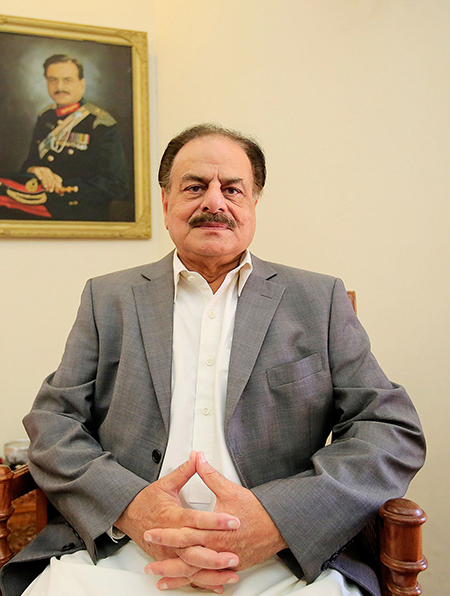Gen. Hamid Gul
Founder (TJP)
“Fortunes Of States Through Individual Prowess Ripen Each Man One Star Of Their Ascendant (Destiny)”
Hamid Gul was born on 20 November 1936 in Sargodha in the Punjab Province of British India (now in Punjab, Pakistan) into a Punjabi-Pathan family to parents Muhammad Khan and his wife, who originated from Buner Tehsil in Swat District.
Gul ancestrally descended from the Yusufzai tribe of Pashtuns. His father, who was a Subedar-Major in the British Indian Army, moved from Swat to Lahore before settling down in Sargodha, where he got arable land, his grandfather was a Khilafat Movement activist while his great-grandfather Faiz Khan was a Deobandi who participated in the jihad of Syed Ahmad Barelvi and Shah Ismail Dehlvi.
He got his early education from a school in his village. He then received admission into Government College Lahore, before being admitted to Pakistan Military Academy Kakul.
Hamid Gul was commissioned in the Pakistan Army in October 1956 with the 18th PMA Long Course in the 19th Lancers regiment of the Armoured Corps.
Lieutenant General Hamid Gul HI SI SBt was a Pakistani three-star general and defence analyst. Gul was notable for serving as the Director-General of the Inter-Services Intelligence, Pakistan’s premier intelligence agency, between 1987 and 1989.
The Tehrik Jawanan Pakistan (TJP) has released its manifesto titled “Towards a Stronger Pakistan: “Unity, Proserity, Progress” this slogan was put in the spotlight by Gen Hamid Gul and Abdullah Gul. The vision document that has been put together is a broad one that focuses on indigenous development, self-reliance and national unity with a view to elevating Pakistan to the level of a resilient and self-sustaining nation. The main focus of TJP’s plan is the economic development, with the strategic measures targeting the energy efficient industrial development, infrastructure development, and significant investments in technology sector in the perspective of increasing the annual industrial growth rate by 6% and the GDP contribution of technology sector by 20% within five years.


